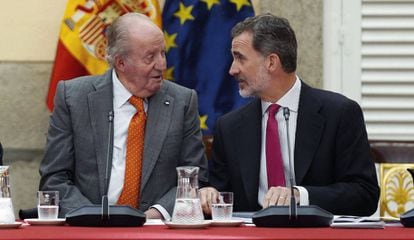Adel al-Jubeir, the Saudi diplomat who endorsed the $100m donation to Spain’s King Juan Carlos
According to a Swiss public prosecutor, the government minister met on two occasions with the manager of one of the former monarch’s bank accounts
/cloudfront-eu-central-1.images.arcpublishing.com/prisa/UXFQ6NJYV75625EUBT7AKMWOW4.jpg)

Adel al-Jubeir, 58, the current Saudi minister of state for foreign affairs, was the authority who allegedly endorsed the origin of the $100 million that was transferred to an account linked to Spain’s then-King Juan Carlos I in Swiss private bank Mirabaud. That’s according to documents from a probe in the latter country being carried out by the public prosecutor, and to which EL PAÍS has had access.
Adel al-Jubeir is one of the most-seen faces in Saudi Arabian politics, having served as foreign policy advisor to King Abdullah, who died in 2015, as well as formerly holding the role of minister of foreign affairs.
The document states that it is a “free donation” to Juan Carlos from the king of Saudi Arabia
The manager of the Swiss bank account in question, Arturo Fasana, met on two occasions with Adel al-Jubeir: the first time in July 2008, in the Saudi embassy in Washington where they ate together, and the second in the terminal of the aviation company Jet Aviation in Basel, Switzerland.
Both times, according to Fasana’s testimony to Swiss prosecutor Yves Bertossa, the Saudi diplomat explained that the money was a gift. The manager said in his judicial declaration that he asked whether it “was in exchange for any service,” and added that the ambassador responded: “No, it’s a gift for his brother.”

This version of the origin of the Saudi donation appears in the “know your client” document that was filled out for the Mirabaud private bank by Fasana when the account was opened in Geneva in the name of the Panamanian company Lucum, the main beneficiary of which was the then head of state.
In the part of the form corresponding to the origin of the money, the document states that it is a “free donation” from the king of Saudi Arabia, who at that time was King Abdullah. Fasana told the prosecutor that he filled out that document based on the aforementioned interviews with the Saudi diplomat.
The funds entered the Swiss bank account via a deposit made by the Saudi Foreign Affairs Ministry. The bank was presided at the time by its then-owner, Yves Mirabaud. The compliance department of the private bank, which was then family owned, did not stand in the way of the operation despite the fact that the main beneficiary of the Lucum foundation was the then-king of Spain. In terms of financial regulations, Juan Carlos was what is referred to as a “politically exposed person,” or PEP, according to the version offered by the bank to the Swiss justice system.
Judicial sources say that Saudi Arabia does not usually respond to letters rogatory from European courts
Based on these documents, which were gathered during a number of searches as part of the judicial probe, Swiss prosecutor Yves Bertossa pointed to Adel al-Jubeir as the person who attested to the origin of the funds. The prosecutor included this information in the letters rogatory that he sent last August to Spanish High Court Judge Manuel García Castellón. Bertossa is investigating a possible offense of money laundering. Adel al-Jubeir has not responded to questions sent by EL PAÍS to the Saudi Foreign Affairs Ministry.
Sources close to the Swiss judicial probe said that there is no evidence that Bertossa has managed to secure the testimony of the Saudi diplomat in order to confirm whether or not the manager of the account, Arturo Fasana, met with him to account for the origin of the $100 million. The account manager has testified to the prosecutor that the confirmation of the origin of the funds was merely verbal, i.e. via the word of the ambassador, and was not backed by any documentary evidence. Judicial sources say that Saudi Arabia does not usually respond to letters rogatory from European courts.
In 2012, a total of €64.8 million was transferred from that account to Corinna Larsen, a Monaco-based businesswoman described as a close friend of Juan Carlos. The funds were paid into a bank in the Bahamas called Gonet & Cie. The Swiss prosecutor is investigating whether the aforementioned deposit is related to alleged commissions paid for the construction of the high-speed AVE train link to Mecca, which was carried out by a consortium of Spanish companies led by Spain-based multinational OHL. Larsen’s defense lawyers deny this, and claim that the money was a donation from Juan Carlos.

According to the prosecutor, the winning companies in the consortium had included in their offer “a 30% discount.” In his letters rogatory, Bertossa ties this project to the deposit that was made in the Lucum account, and to the later transfer of the money to the account held by Larsen in the Bahamas.
Last month, Spain’s current king, Felipe VI, announced he is relinquishing any inheritance from his father, after news emerged that he himself was a beneficiary of Lucum and another foundation named in the investigation.
On May 27, 2019 Juan Carlos dropped all official activities and retired from public life. He abdicated the throne in 2014, in the wake of waning popularity fueled in part by a corruption scandal involving his son-in-law and by a hunting trip during which his relationship with Corinna Larsen emerged.
Juan Carlos, who served on the throne for 39 years and is widely credited with helping stop the February 23, 1981 coup attempt in Spain, has hired a former anti-corruption prosecutor, Javier Sánchez-Junco Mans, to represent him if he ultimately faces a judicial investigation.
Experienced diplomat
Adel al-Jubeir is an experienced diplomat and the first Saudi foreign affairs minister who does not belong to the royal family. He has been part of the Saudi diplomatic service since 1987, and graduated from the University of North Texas having studied politics and economics. In 2005, King Abdullah named him foreign policy advisor at the Royal Court.
He served as ambassador in Washington from 2007 to 2015, a time during which the FBI dismantled a plan allegedly concocted by Iran to assassinate him, according to then-secretary of state Hillary Clinton.
As well as the war in Yemen, one of his major diplomatic challenges has been to respond to the killing of journalist Jamal Khashoggi in the Saudi consulate in Istanbul. He was the first Saudi official to class the disappearance of the reporter as a killing, during an interview with the US network Fox News.
During a visit to Madrid, in November 2017, Adel al-Jubeir granted an interview to EL PAÍS, during which, when referring to the purge and arrest of 200 Saudi princes and business figures, he said: “When there is corruption there is no justice. When there is corruption there is waste and bad management. There must be a clean government that is accountable.”
English version by Simon Hunter.
/cloudfront-eu-central-1.images.arcpublishing.com/prisa/I6OVIIZ5MJE5XKKKC6HJGG3ADY.jpg)
/cloudfront-eu-central-1.images.arcpublishing.com/prisa/J6H6ESC5CZCBYDEWXDTO6CY3PA.jpg)










































